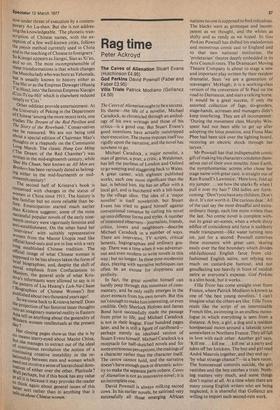Rag time
Peter Ackroyd
The Caves of Alienation Stuart Evans (Hutchinson £4.95) God Perkins David Pownall (Faber and Faber £3.95).
Villa Triste Patrick Modiano (Gollancz £4.50) The Caves of Alienation ought to be a success. Its theme—the life of a novelist, Michael Caradock, as chronicled through an anthology of his own writings and those of his critics—is a good one. But Stuart Evans's good intentions have actually outstripped their execution. The theme imposes itself too rigidly upon the narrative, and the novel has nowhere to go.
Michael Caradock, a major novelist, a man of genius, a poet, a critic, a Welshman, has left the purlieus of London and Oxford to go weeping and staggering back to Wales. A great career, with eighteen published works, each one more significant than the last, is behind him. He has an affair with a local girl, and is butchered with a bill-hook by the village idiot. The idea of a 'major novelist' is itself novelettish, but Stuart Evans has tried to guard himself against conventional romance by cutting his novel up into different forms and styles. A number of interested observers—journalists, friends, critics, lovers and neighbours—describe Michael Caradock in a number of ways. There are interviews, TV scripts, critical laments, hagiographies and ordinary gossip. There was a time when it was adventurous and even modern to write novels in this way; but no longer. In these post-modernist days, playing with narrative techniques can often be an excuse for sloppiness and prolixity.
In fact, the great novelist himself can hardly peep through this mountain of commentary, and he only really emerges in the short extracts from his own novels. But this isn't enough to make him interesting, or even credible. Only Sherlock Holmes and James Bond have successfully made the passage from print to life, and Michael Caradock is not in their league. Four hundred pages later, and he is still a figure of cardboard— perhaps merely an idealised version of Stuart Evans himself. Michael Caradock is a receptacle for half-sketched novels and for some extraneous perceptions, the makings of a character rather than the character itself. The centre cannot hold, and the narrative doesn't have enough pace or dramatic activity to make the separate parts cohere. Caves of Alienation is not an innovative novel; it is an incomplete one.
David Pownall is always milking sacred cows. In his earlier novels, he satirised very successfully all those emerging African
nations no one is supposed to find ridiculous. The blacks were as grotesque and incompetent as we thought, and the whites as shifty and as randy as we hoped. In Goa Perkins Pownall has shifted his malodorous and monstrous comic cast to England and to that new national institution, the 'proletarian' theatre deeply embedded in its Arts Council roots. The Dramacart Moving Theatre Company is about to stage a new and important play written by their resident dramatist, Sean 'we are a generation of scavengers' McHugh; it is a working-class version of the conversion of St Paul on the road to Damascus, and stars a talking horse. It would be a great success, if only the assorted collection of fags, do-gooders, stage-hands, actresses and managers didn't keep interfering. They are all incompetent : 'During the movement class Murphy Winspear had not been able to get up after adopting the lotus position, and Fiona Mac Phee had been sick over the lighting board, receiving an electric shock through her larynx.'
Mr Pownall has that indispensable comic gift of making his characters condemn themselves out of their own mouths. Joan Earth, the nymphomaniac actress who chose her stage name with great care, is straight out of Ken Russell's Lawrerice: 'Here love, fold up my jumper. ... see how the sparks fly when I pull it over my hair?' Old ladies are forthcoming : 'Don't you have any children. Don't do it. It's not worth it. Die curious dear.' All of the cast say the most dreadful and extraordinary things, each line more witless than the last. No comic novel is complete without its great set-scenes, when a whole dizzy edifice of coincidence and farce is suddenly made transparent—like water turning into ice, just for a second. Pownall contrives these moments with great care, skating easily over the fine boundary which divides old-fashioned English farce from oldfashioned English satire, not relying too much on custard-pie humour, and not genuflecting too heavily in front of modish satire at everyone's expense. God Perkins is a slim book, but it works.
Villa Triste has come straight over from France, where Patrick Modiano is known as one of 'the best young novelists.' I can't imagine what the others are like. Villa Triste reads like the script of an interminable French film, swimming in an endless monologue in which everything is seen from a distance. A boy, a girl, a dog and a resident homipsexual moon around a lakeside town somewhere in Northern France. They all fall in love with each other. Another girl says, 'Kill me ... kill me kill me' at a party and takes off her knickers. The boy and girl read Andre Maurois together, and they end up— `by what strange chance?'—in a bare room. The homosexual commits suicide, the girl vanishes and the boy catches a train. Nothing matters very much, and some things don't matter at all. At a time when there are many young English writers who are being neglected, it is shameful that Gollancz are willing to import such second-rate work.






































 Previous page
Previous page